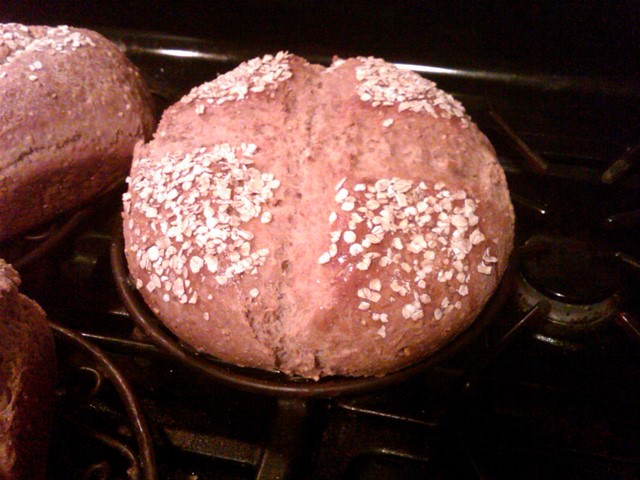I've posted a few questions here and there, so I think it's time I introduce myself!
My name is Maria. I'm new to bread baking, but totally obsessed! I haven't bought a loaf of sandwich bread for my family since January, and I'm probably baking 2-3 days of the week!
I'm learning a lot from this site -- and hopefully will not be intimidated much longer by terms like poolish, biga, and levain. My friend gave me some starter about a month ago, and I made a sourdough baguette, and so I'm not afraid of the starter anymore! Also intimidated by the weights, rather than seeing things in tbsp and cups.
Here is a loaf I made today with my kids' favorite sandwich recipe, but instead of using honey I used maple syrup, and used steel cut oatmeal in the flour instead of rolled oats. Much better texture, almost nutty. I only have 2 loaf pans, so I used a clay tortilla warmer to bake it in! I'm learning to be comfortable with experimenting, which I do in cooking all the time.

=== I'm learning a lot from this site -- and hopefully will not be intimidated much longer by terms like poolish, biga, and levain. My friend gave me some starter about a month ago, and I made a sourdough baguette, and so I'm not afraid of the starter anymore! Also intimidated by the weights, rather than seeing things in tbsp and cups. ===
Welcome! Please don't feel intimidated about asking questions; we love answering them and we'll keep at it until you are happy with the answer ;-)
Also, if you get a good scale (I use a MyWeigh i5000) with straightforward basic functions then you will find the whole weights thing much easier. Admittedly I always liked chem lab (way better than I liked chemistry) but with just a little practice I have found I can put together my standard recipes 3x faster using a scale than with volume measurements. And much easier to increase/decrease amounts when needed too.
sPh
Using a digital scale has given me confidence and also helps make my loaves more consistent. Certainly doesn't have to be expensive. I picked mine up at KAF store for under $30; it does all I would ever need it to do and was super easy to learn. Mike in Maine
Hi there, Maria. Glad you joined the group. From the looks of your results I suspect you might have a thing or two you could teach the rest of us.
You mentioned "I'm learning to be comfortable with experimenting, which I do in cooking all the time."
That's great. Just be sure you get a very good handle on all the basic basic science associated with formulas and mechanics of handling before you venture too far out Experimenting requires that you understand what worked and what didn't and being able to develop a plan for making corrections. A lot of new bakers become frustrated and abandon their interest in bread making when they move too quickly.
If you're willing, why not share the formula for that loaf you feature in the image above. Looks scrumptuous.
Here is the recipe, which I doubled. The recipe is in cups and tbsp/tsp, because I don't have a scale, so I'm definitely showing my green horns.
Let the following soak in 2 cups of boiled water for an hour:
1 cup of steel cut oats
1/2 cup maple syrup
2tbsp butter
2 tsps salt
***
1 pkge dry yeast
1/4 cup lukearm water
5 cups of flour (I use 3 cups of ww, then 2 cups bread)
***
combine, and knead until smooth and elastic
allow to double in bulk, about 1+3/4 hrs
knead and shape, rise for 45 mins
bake at 350 for 40-50 minutes
use a pastry brush to paint a thin layer of honey or syrup on the crust and sprinkle with rolled oats.
I've also made it with honey and rolled oats, but the texture is much nicer with steel-cut oats.
The crumb is not too airy, but I suppose it is how it should be for a my kids' sunbutter and jelly sandwiches! (Peanut allergy in the house).